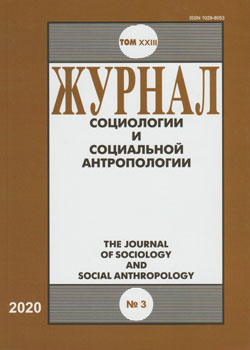«Четвертая парадигма» научных исследований и социогуманитарные науки
Аннотация
The article considers the concept of the “fourth paradigm” and the features of this paradigm in relation to socio-humanitarian Sciences. The “fourth paradigm” is characterized by the emergence of fundamentally new scientific methods related to the processing of big data, and is focused on obtaining conclusions arising from the data. The author considers the emergence of two branches of science within the fourth paradigm: computer science and digital science. It is noted that this division is typical not only for natural Sciences, but also for social and humanitarian Sciences. It is noted that big data technologies can “skip” marginalized groups and social minorities. It is argued that within the fourth paradigm, at least two types of science have developed and function that use different epistemological strategies: data-centric science with an inductive methodology, and data-driven science that uses a more complex methodology that combines induction, deduction, and abduction. Quantitative and qualitative research should not be contrasted; it is necessary to combine big data and small data. Epistemological strategies of the fourth paradigm in the social Sciences and Humanities, without abandoning big data, systematize and interpret this data taking into account the context and the role of the researcher in the research process. This perspective allows us to clarify the epistemological and methodological status of modern social and humanitarian knowledge as combining elements of classical and non-classical, quantitative and qualitative approaches.Литература
Anderson C. (2008) The end of theory: The data deluge makes the scientific method obsolete. Wired. 23 June [https://www.wired.com/2008/06/pb-theory/] (accessed: 01.08.2020).
Bolshakov N.V. (2017) Sochetat', kombinirovat', smeshivat': kachestvennyye i kolichestvennyye metody v sovremennoy issledovatel'skoy praktike [Bring together, combine and mix: Qualitative and Quantitative methods in Modern Research Practices]. Monitoring obshchestvennogo mneniya: Ekonomicheskiye i sotsial'nyye peremeny [Monitoring of Public Opinion: Economic and Social Changes], 3: 21–29 (in Russian).
Boyd D., Crawford K. (2012) Critical questions for big data: Provocations for a cultural, technological, and scholarly phenomenon. Information, Communication and Society, 15(5): 662–679.
Chandler D. (2015) A World without Causation: Big Data and the Coming of Age of Posthumanism. Millennium: Journal of International Studies, 43(3): 833–851.
Curran J. (2013) Big Data or “Big Ethnographic Data”? Positioning Big Data within the ethnographic space. EPIC. Ethnographic Praxis Industry Conference: 62–73.
Dudina V.I. (2016) Tsifrovyye dannyye — potentsial razvitiya sotsiologicheskogo znaniya [Digital data — the potential for the development of sociological knowledge] Sotsiologicheskiye issledovaniya [Sociological research], 9: 21–30 (in Russian).
Gahegan M. (2020) Fourth paradigm GIScience? Prospects for automated discovery and explanation from data. International journal of geographical information science, 34(1): 1–21.
Gieseking J.J. (2018) Size matters to lesbians, too: Queer feminist interventions into the scale of big data. The Professional Geographer, 70(1): 150–156.
Guba K. (2018) Bol'shiye dannyye v sotsiologii: novyye dannyye, novaya sotsiologiya? [Big Data in sociology: New Data, New Sociology?] Sotsiologicheskoye obozreniye [Russian Sociological Review], 17(1): 213–236 (in Russian).
Herskovits M.J. (2011) Sotsial'nyy pattern: metodologicheskoye issledovaniye [Social Pattern: A Methodological Study]. Lichnost. Kultura. Obshchestvo [Personality. Culture. Society], XIII (1: 61–62): 34–47 (in Russian).
Hey T., Tansley S., Tolle K. (2009) Jim Grey on eScience: A transformed scientific method. In: Hey T., Tansley S., Tolle K (eds.) The Fourth Paradigm: Data-Intensive Scientific Discovery. Redmond: Microsoft Research: XVII–XXXI.
Kitchin R. (2013) Big Data and Human Geography: Opportunities, Challenges and Risks. Dialogues in Human Geography, 3(3): 262–267.
Kitchin R. (2014). Big Data, New Epistemologies and Paradigm Shifts. Big Data & Society, 1(1): 1–12.
Kuhn T. (1977) Struktura nauchnykh revolyutsiy [The structure of scientific revolutions]. Moscow: Progress (in Russian).
Lynch C. (2009) Jim Grey’s Fourth Paradigm and the Construction of the Scientific Record. In: Hey T., Tansley S., Tolle K (eds.) The Fourth Paradigm: Data-Intensive Scientific Discovery. Redmond: Microsoft Research: 177–185.
Mohr J.W., Bogdanov P. (2013) Introduction-Topic Models: What They Are and Why They Matter. Poetic, 41(6): 545–569.
Mozhaeva G.V., Mozhaeva Renha P.N., Serbin V.A. (2014) Cifrovaya gumanitaristika: organizacionnye formy i infrastruktura-issledovanij [Digital Humanities: organizational forms and infrastructure research]. Vestnik Tomskogo gosudarstvennogo universiteta [Tomsk State University Journal], 389: 73–81 (in Russian).
Platonova S.I. (2020) Bolshie dannye: sozdanie vyzovov i vozmozhnostej v socialnyh naukah [Big Data: challenges and opportunities in social sciences]. Manuskript [Manuskript], 13(4): 119–123 (in Russian).
Plotichkina N.V. (2020) Medijnaya mifologiya «social'nogo» v sovremennom obshchestve [Media mythology of the social in the contemporary society]. Vestnik RUDN. Seriya: Sociologiya [Vestnik of RUDN. Series: Sociology], 20(2): 239–251 (in Russian).
Resnyansky L. (2019) Conceptual frameworks for social and cultural Big Data analytics: Answering the epistemological challenges. Big Data & Society, 6(1): 1–12.
Ruberg B., Ruelos S. (2020) Data for queer lives: How LGBTQ gender and sexuality identities challenge norms of demographics. Big Data & Society, january-june: 1–12.
Sivkov D.Yu. (2017) Bol'shiye dannyye v etnografii: vyzovy i vozmozhnosti [Big Data and Ethnography: Challenges and Opportunities]. Sotsiologiya nauki i tekhnologiy [Sociology of Science and Technology], 8(1): 56–68 (in Russian).
Sukhodolov A.P., Ivantsov S.V., Molchanova T.V., Spasennikov В.А. (2019) Big data kak sovremennyy kriminologicheskiy metod izucheniya i izmereniya organizovannoy prestupnosti [Big data as a modern criminological method of studying and measuring organized crime]. Vserossiyskiy kriminologicheskiy zhurnal [Russian Journal of Criminology], 13(5): 718–726 (in Russian).
Szalay A., Grey G. (2006) 2020 Computing: Science in an exponential world. Nature, 440: 413–414.
Van Dijck J. (2014) Datafication, dataizm and dataveillance: Big data between scientific paradigm and ideology. Surveillance and Society, 12(2): 197–208.
Zhuravleva E.Yu. (2012) Epistemicheskiy status tsifrovykh dannykh v sovremennykh nauchnykh issledovaniyakh [Epistemic status of digital data in modern scientific research]. Voprosy filosofii [The questions of philosophy], 2: 113–125 (in Russian).
Zhuravleva E.Yu. (2018) Vyzovy tekhnologiy «bol'shikh dannykh» dlya sovremennykh sotsiogumanitarnykh nauk [Calls Tecnologies ‘Big Data’ for the Modern Social Sciences and Humanities]. Voprosy filosofii [The questions of philosophy], 9: 50–59 (in Russian).

